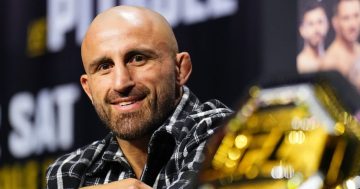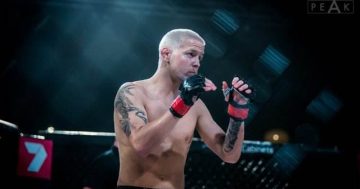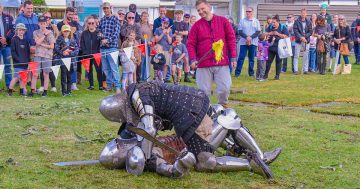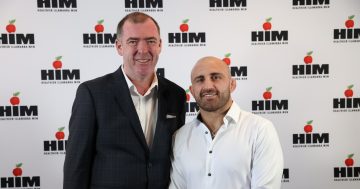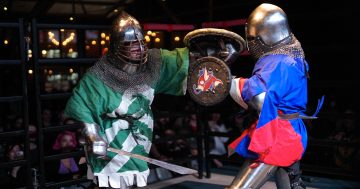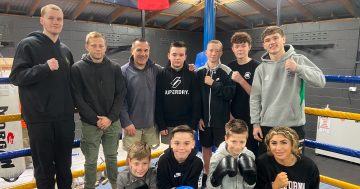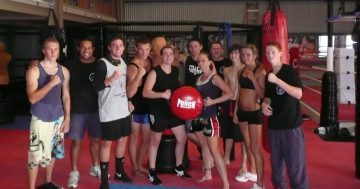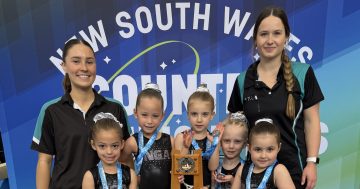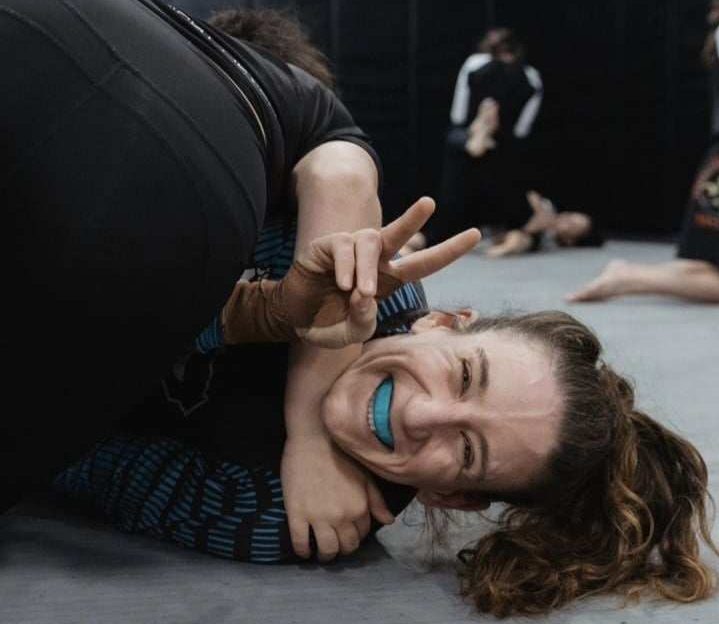
Rebecca Mauger in her happy place. Photo: Supplied.
The world knows the name of a concreter from Shellharbour now – Alexander Volkanovski shot to fame as featherweight champion in the UFC in 2019, and has successfully defended his title ever since.
Training out of a gym in Windang, it would be easy to write Volkanovski off as a one-in-a-million, a diamond in the rough whose natural talent would have shone through in any setting.
But it’s more likely he’s the first in a generation of Illawarra champions.
A martial arts community of extraordinary breadth, depth and enthusiasm has exploded across the region over the past decade. For every 7000 people, there’s a martial arts gym. And they’re producing plenty of hungry fighters.
Shortly, Rebecca Mauger will step into a cage and fight her heart out.
In past lives, the 32-year-old obtained an undergraduate degree in genetics and a master’s degree in business management. She successfully ran a chain of dental practices for a decade.
She trained in judo growing up, and became a national champion at 16, before moving to boxing, kickboxing and Brazilian jiujitsu as an adult, fitting a full-time training regimen around her full-time job.
Last year, she organised her first successful fight promotion in Wollongong, and followed it up with five more.
She also took a step back from the corporate world, giving her more time to dedicate to her passion for combat sports – a passion the Illawarra has proved the perfect home for.
“Just before a fight, it’s like a kettle boiling, steaming up … I’m so excited and I can’t wait to get in the ring,” she said.
“I’m in awe of the fact that someone is going to let me do this. I don’t have a fear of losing, I just want to know what I’m capable of.
“I love it, I think about it all the time, and my only fear is of disappointing myself.”
Organising her first fight promotion took all of Rebecca’s corporate and combat skills, as well as a huge dose of community support.
Terrified she’d bitten off more than she could chew, the response from the Illawarra made the event a resounding success.
“I went in with the intention to showcase the Illawarra, all those gym talents who had not had a chance to fight because of COVID, or because they needed to get on bigger promotions in Sydney,” she said.
“People jumped at it, it was phenomenal. It’s an awesome community; in the Illawarra it’s been nothing but relentless support.
“It feels like an acknowledgement that the more we commit the better the community will be and the better the fighters will be.”
Rebecca says the commitment combat sports demand is key to their burgeoning popularity.
Training requires an enormous amount of trust in sparring partners, who have the potential to cause significant injuries if they are reckless, inexperienced, or aggressive.
And finding the fun in getting beat up multiple times a week means being as fit and healthy as possible.
It’s another part of the sport that draws people together.
“Because martial arts is a lifestyle sport, you have to commit so much to step in and compete even at an amateur level,” she said.
“You’re committing your eating, sleeping, socialising, your physical and mental health, even for an amateur boxing fight.
“Some people do it because of that discipline, because of the structure it gives your lifestyle, it becomes a value system.
“Your day-to-day decisions become aligned towards achieving your goal, and that’s very comforting.”
Amateur fighter Aaron Curry agrees.
The 23-year-old Bellambi man enjoyed martial arts as a kid, before moving from Victoria to Wollongong.
As a teenager he found himself overweight, and struggling to find a direction in life.
He knew he needed to improve his health, and remembered how much he’d enjoyed martial arts as a kid.
“At the start it was really hard, but it made me feel good, so I kept going, even if I didn’t feel good while I was there,” he said.
“It gave me something to do and something to look forward to. It’s given me self-discipline and self-esteem.
“All my relationships now are based around martial arts, everything I do revolves around it.”
Paradoxically, having a single-minded focus on martial arts broadened Aaron’s horizons.
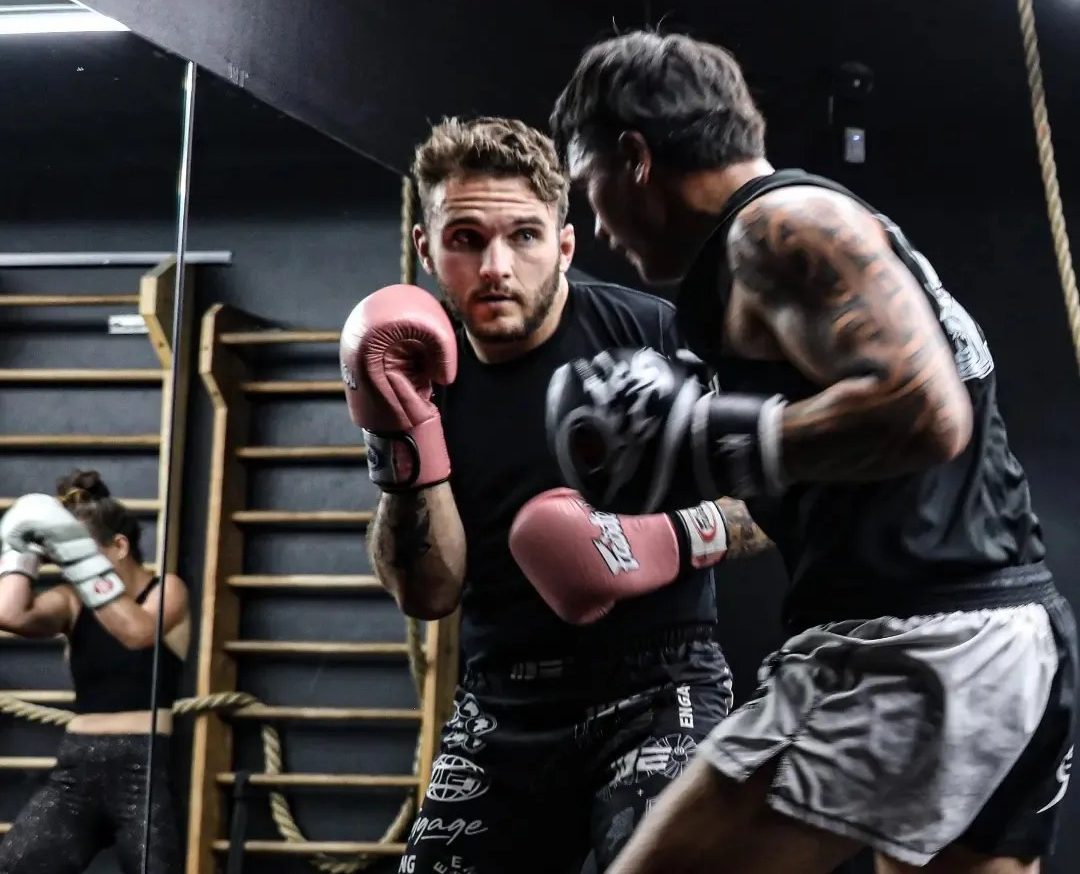
Aaron Curry says most of his closest friends now are training partners. Photo: Supplied.
“I’m around people I wouldn’t normally think I would be friends with, but we all share one thing in common,” he said. “It’s made me think differently about the world and changed who I was as a person.”
The COVID-19 lockdowns put a stop to training with others, and drove home to Aaron how much the sport meant to him.
The realisation spurred him into taking on his first fight, and the preparation gave him a deeper understanding of himself.
“During the first lockdown I lost my job and everything, training was the only thing I could do at home,” he said.
“It made me realise how passionate I was about the sport, and I didn’t want to just do it as a hobby.
“Initially it was easier than I expected because I was already training a fair bit, so adding in an extra session here or there wasn’t that hard.
“The mental preparation, to stand across from someone who has been training to fight you, was harder than I thought it was going to be.
“Training went from being fun to being for a specific purpose. Everything I was doing was about my opponent. It became much more personal.
“Immediately before my first fight I felt pretty good, I was confident and just a little nervous because I hadn’t done it before.
“When we walked out, and they closed the cage door, that was when the nerves kicked in, but during the fight I just felt alive.
“It’s not like anything else.”
Despite losing the match by decision, Aaron said it was one of the best experiences of his life.
He’s determined to keep chipping away, partly because of the joy he gets from being in the cage, and partly because of the structure working towards a fight brings to all areas of his life.
He encouraged anyone interested in training in any discipline, whether for fun or for a fight, to give one of the many gyms across the Illawarra a try.
“Everyone is very welcoming, and the level of coaching in the Illawarra is phenomenal,” he said.
“There’s an incredible number of coaches in the region who have fought and trained overseas – you’d be surprised.
“Every gym is different; there are lots of small specialty gyms instead of globo-gyms, so whatever style of training you’re looking for, you’ll find a gym that’s doing it.
“I’ve very rarely seen that stereotypical thuggish martial artist – they’re generally not welcome and they don’t stick around very long.”
His one word of warning?
“Be frightened of the women, all of them, and the skinny scrawny guys,” he laughed.









